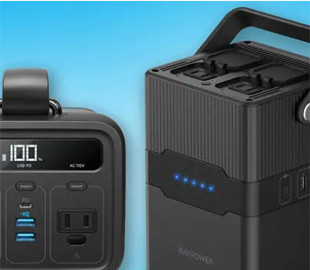
Portable charging stations – it is a universal solution for powering various devices and appliances in various situations. From hiking to backup power during power outages – with this gadget, you will always be autonomous. Autumn-Winter 2024 can be very difficult, so it's better to prepare in advance.
Choosing the right charging station requires careful consideration of several important factors, because first you need to make sure that the device meets your specific needs. Here's a quick guide from Techno 24 that brings together the key aspects to consider when choosing a portable charging station.
Battery capacity
Perhaps the most important characteristic when choosing a charging station – its battery capacity. This aspect directly affects the device's ability to provide power for long periods of time.
While larger capacity charging stations offer longer runtimes, they can compromise portability due to their size.
- To determine appropriate battery capacity for your needs, calculate the energy consumption in watt-hours.
- Determine the wattage of each appliance or device you plan to power and multiply it by the expected duration of use.
- Adding these values will give you a rough estimate of your daily energy needs.
< p>It is advisable to choose a charging station with sufficient battery capacity to meet daily needs, as well as provide additional capacity for emergency situations that may require long-term power supply.
Power Output and Surge
Understanding the power requirements of the appliances you intend to power is critical. Different devices may have different power requirements, especially during startup. For example, a refrigerator may require only 300 watts for continuous operation, but may require up to 2000 watts of pulsed power during start-up.
Make sure that the maximum output power of the charging station exceeds the impulse power requirements of the most demanding appliance you plan to use. Some advanced charging stations have more power to keep devices running smoothly.
Calculator to help you calculate everything
Calculator rewlogan/power created a Ukrainian product designed by a designer, intended for choosing a charging station without unnecessary complications. It's easy to understand how it works, because the interface is intuitive.
You simply choose the devices you need to power up (and the base of devices here is quite large), indicate their power (by default, the average statistical value is taken into account), choose the desired battery life and the calculator gives you approximate consumption and station models that may suit you.
Longevity
Investing in a durable charging station is essential to ensure that it serves you efficiently for many years. The materials from which the device is made play a vital role in its durability. Look for stations with sturdy construction, such as solid steel or high-strength plastic that protects the internal components from the outside.
Battery type also affects the life of the charging station. Lithium-ion batteries usually have a longer life – five to ten years compared to lead-acid batteries.
At the same time, lithium iron phosphate LiFePO4 (LFP) batteries are even more durable and less prone to rapid degradation. Choosing a station with a long-lasting battery can ensure long-term reliability.
Number and types of connectors
Make sure the charging station you choose has enough connectors receptacles and socket outlets to suit your specific needs. Consider which appliances need to run continuously, such as lighting, refrigerators or a heater, and make sure the station's outlets meet your requirements.
Summary
Portable charging stations are a convenient source of energy in a variety of situations, from outdoor trips to emergencies. Choosing the right device is critical to efficiently meeting your power needs. By considering factors such as battery capacity, power output, durability, and availability of the right connectors, you can make an informed decision and ensure that your charging station is reliable and meets your specific requirements.

